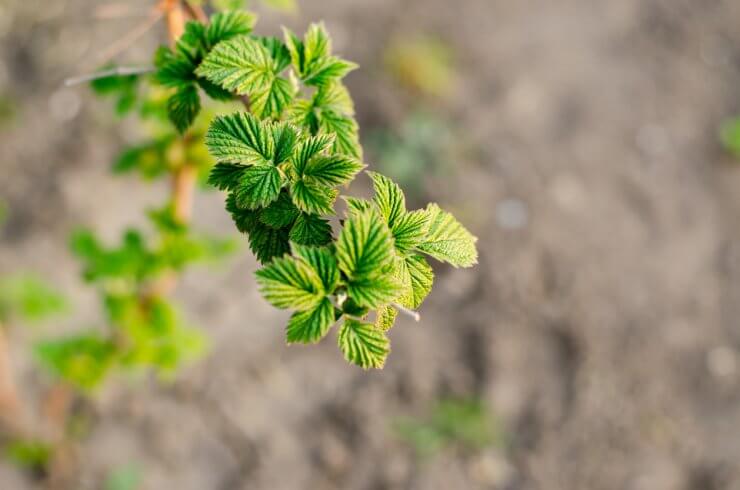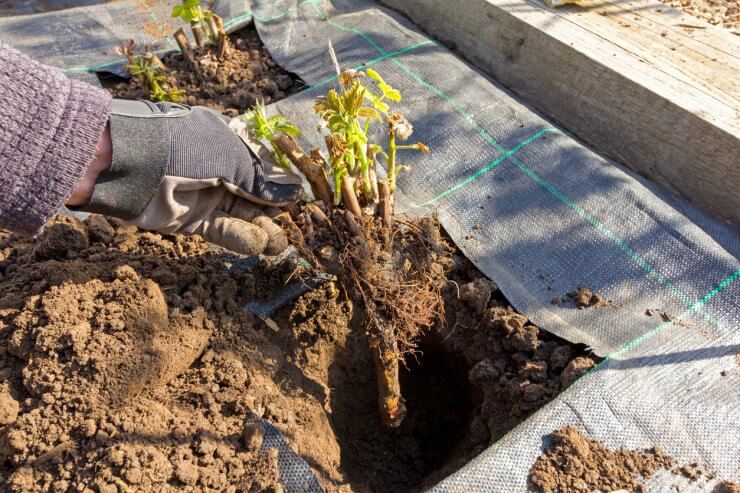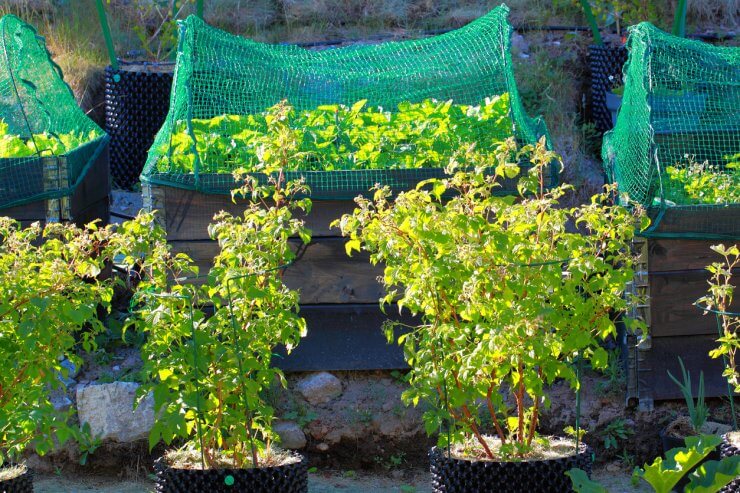
Raspberries in open land
Raspberries are easy to plant and grow, but they have a few requirements than can affect where you plant them. Raspberries hate wet feet, so they require sandy or loamy soil that drains well. Raspberry plants also spread and can grow tall, so many home gardeners choose to plant them along a fence or wall, in rows, and apart from other garden plants. Raspberry plants also need full sun to thrive and fruit, and prefer soil with a pH of around 6.
If you have a large outside plot of land with the right soil and the right conditions for watering and draining, you might have the ideal situation for planting your raspberries directly in the ground. If, however, your soil has too much clay or gets soggy, you might want to consider planting in raised beds or in containers.
Growing in Raised Beds

Raspberry cane being planted in raised bed
Raised beds are a great option for growing raspberries if you have perpetually wet, heavy soil. Creating raised beds for your raspberry garden can be a lot of work the first time you set up your beds, but having raised beds allows you more control over your growing environment. You’ll discover that watering, irrigation, weeding, and even harvesting are much easier, with items closer to your reach and contained in a space that is more manageable than growing in open land.
To create nicely contained raised beds for your raspberries, enclose your raised beds with wooden sides 18 to 20 inches deep—this will give the plants’ roots room for spreading. Raspberry plants spread above ground, too, so allow 3 to 5 feet between each plant. Don’t worry if your patch looks sparse at first, it will start filling in the gaps the first year.
A raised bed garden is less likely to contain the seeds of weeds that are often found in garden soil. You’ll minimize the incidence of weeds overall, which will save you time and effort later. Weeding itself is much easier with raised beds, because you don’t have to get down so far on the ground to remove weeds.
Raised Bed Planting Tip: Be sure to amend your soil with compost at least once a year. Otherwise, your soil can become less productive for your plants.
Growing Raspberries in Containers or Pots

Raspberries growing in pots
If you don’t have the space for growing in open land or in raised beds—let’s say you live in an apartment with no land of your own for a garden, for example—you can grow raspberries in containers or pots on your balcony, porch, patio, or deck.
One great advantage to container gardening is the ability to move plants around more easily to maximize their exposure to the sun. Raspberries need six to eight hours of sun a day to fully fruit.
Tip: If you have trouble moving pots around, because they’re too heavy or too bulky, try putting your pots on slightly raised rolling casters so you can more easily move them around your space.
Raspberry plants like to roam, but you can grow them in containers if you follow some guidelines. Select a dwarf variety of raspberry plants, preferably one without thorns, like Raspberry Shortcake. As with planting raspberries in the ground or beds, make sure you put them in pots that have room for the roots—at least 2 to 3 feet tall and just as wide. Half barrels or five-gallon tubs work well. Just make sure the pots have drainage holes. Also, though they’re pretty, avoid ceramic and terra cotta pots as they might crack as they freeze and thaw during the winter. Fill the containers with potting mix, not ground soil, and add organic fertilizer just after planting.
Though weeding is much easier with containers, you have to be more vigilant about watering and irrigation as plants can dry out much faster than when they’re in the ground—but overwatering your raspberries can cause root rot. Plus, containers can lose important soil nutrients throughout the season, so you might need additional fertilizer.
At the end of the growing season, prune the dead canes (those with no new growth) at soil level and place the pots in an unheated garage, shed, or other cool, sheltered place where they can go dormant. Return them to their sunny spot after the danger of frost passes in the spring. If you plan to keep the container plants in place year-round, insulate them with mulch for protection.
How do you grow your raspberries—in open land, in raised beds, or in containers? Why do you prefer your method? Please tell us your tips and tricks for creating a bountiful raspberry garden.


 Previous
Previous


I grew raspberries in ceramic pots until last year (2022). Then the heat wave killed them. I think I’ll try again next year.
I have grown raspberries for about 10 years in 5 gallon pots. (Zone 8b). 10 months of the year the pots are in my potting area. When the berries ripen, I move the pots to my patio. Each morning I can step out of the back door and pick a handful of berries for my breakfast. When the berries are gone, I move the pots back to the potting area.